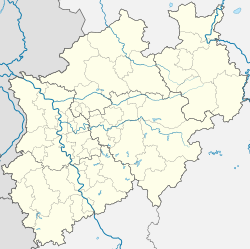This article includes a list of general references, but it lacks sufficient corresponding inline citations. (July 2022) |
Hövelhof is a municipality in the district Paderborn, in North Rhine-Westphalia, Germany. Since 14 March 2012, Hövelhof can use the official prefix Sennegemeinde (English: "Senne municipality").
Hövelhof | |
|---|---|
 Former hunting lodge of the Paderborn prince bishops | |
Location of Hövelhof within Paderborn district  | |
| Coordinates: 51°49′N 08°39′E / 51.817°N 8.650°E | |
| Country | Germany |
| State | North Rhine-Westphalia |
| Admin. region | Detmold |
| District | Paderborn |
| Subdivisions | 5 |
| Government | |
| • Mayor (2020–25) | Michael Berens[1] (CDU) |
| Area | |
• Total | 70.67 km2 (27.29 sq mi) |
| Elevation | 106 m (348 ft) |
| Population (2023-12-31)[2] | |
• Total | 16,704 |
| • Density | 240/km2 (610/sq mi) |
| Time zone | UTC+01:00 (CET) |
| • Summer (DST) | UTC+02:00 (CEST) |
| Postal codes | 33155–33161 |
| Dialling codes | 05257 05294 Hövelhof-Espeln |
| Vehicle registration | PB |
| Website | www.hoevelhof.de |
Geography
editHövelhof is located in the Senne area, the eastern part of the Westfälische Bucht, approx. 10 km northwest of Paderborn. The eastern side of Hövelhof belongs to the Military Training Area Senne.
The municipality is rich of rivers. The Ems, whose springs are adjacent to the north in Stukenbrock, is the largest river that flows through Hövelhof. Smaller rivers are the Haustenbach, the Knochenbach, the Krollbach, the Schwarzwasserbach, the Furlbach, the Holtebach, and the Hallerbach. Hövelhof features a rare river situation: at the Krollbach bifurcation, the Krollbach separates into two rivers that lead to different streams.
Neighbouring municipalities
editDivision of the municipality
edit- Klausheide
- Staumühle
- Espeln
- Riege
- Hövelriege
- Hövelsenne (mostly vacated)
Description
editUnusually for a village as small as Hövelhof, it is relatively self-contained—there are numerous supermarkets, restaurants, clothes shops, travel agencies, pubs and much more, meaning that the village could theoretically remain independent of the city of Paderborn. In fact, the only common feature of a full-fledged town that is missing from Hövelhof is a cinema, for which inhabitants do indeed need to venture into Paderborn City Center—approximately 15 km (10 mi) away. It also has five schools, its own fire brigade, and a library.
History
editThe name of the municipality is derived from the name of the Hövelhof, a grange that was founded around the year 1000. The first official documentation of its name was in 1446. About 200 years latere, in 1645, the last owner died childless. Thus, the Hövelhof fell into the ownership of the local sovereign, the prince-bishop of Paderborn. Close to the farm, the hunting lodge was built in 1661; at the beginning of the 18th century, the first church was erect.
Culture
editHövelhof has two main festivals during the year. The first is the Schützenfest, a celebration of the St. Hubertus Hunters' Guild, which takes place on the hunting grounds. The second is the Hövelmarkt[3], a general village fair with not only market stalls, but also fairground rides and traditional German dances, complete with traditional music and costume.
Infrastructure
editEducation
editHövelhof has ten kindergartens and four schools—two primary and two secondary schools.
Politics
editThe local government is dominated by the conservative CDU.
Coat of arms, seal, and banner
editThe coat of arms of Hövelhof shows historical and geographical symbols:
- The cross in the top field represented the bishop cross from the prince-bishops of Paderborn, who were the sovereigns since the Middle Ages up to 1803.
- The wave line symbolises the brooks and rivers, especially the river Ems.
- The hunting horn stands for the hunting castle, build by the prince-bishop Dietrich Adolf von der Recke in the year 1661.
- The green color stands for the wealth of forest and green areas.
The seal contains the coat of arms with the transcription Gemeinde Hövelhof Krs. Paderborn. The banner is striped lengthways with green and white and has the coat of arms in the upper third.
Notable persons
edit- Heinz Stücke, world traveler and cyclist
Twin town
editHövelhof has a partnership with the French city Verrières-le-Buisson since 29 May 1971.[4] The partnership consists of yearly meetups in either one of the two cities, student exchanges, and more. Hövelhof has also named a small park with a pond after Verrières-le-Buisson.
References
edit- ^ Wahlergebnisse in NRW Kommunalwahlen 2020, Land Nordrhein-Westfalen, accessed 29 June 2021.
- ^ "Bevölkerung der Gemeinden Nordrhein-Westfalens am 31. Dezember 2023 – Fortschreibung des Bevölkerungsstandes auf Basis des Zensus vom 9. Mai 2011" (in German). Landesbetrieb Information und Technik NRW. Retrieved 20 June 2024.
- ^ "Hövelmarkt". www.hoevelmarkt.de. Retrieved 8 August 2021.
- ^ "Partnerstädte – Gemeinde Hövelhof". www.hoevelhof.de (in German). Retrieved 8 August 2021.
External links
editMedia related to Hövelhof at Wikimedia Commons
- Official website (in German)


